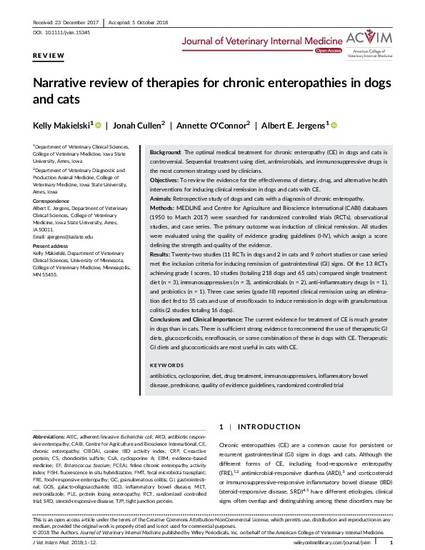
Background The optimal medical treatment for chronic enteropathy (CE) in dogs and cats is controversial. Sequential treatment using diet, antimicrobials, and immunosuppressive drugs is the most common strategy used by clinicians.
Objectives To review the evidence for the effectiveness of dietary, drug, and alternative health interventions for inducing clinical remission in dogs and cats with CE.
Animals Retrospective study of dogs and cats with a diagnosis of chronic enteropathy.
Methods MEDLINE and Centre for Agriculture and Bioscience International (CABI) databases (1950 to March 2017) were searched for randomized controlled trials (RCTs), observational studies, and case series. The primary outcome was induction of clinical remission. All studies were evaluated using the quality of evidence grading guidelines (I‐IV), which assign a score defining the strength and quality of the evidence.
Results Twenty‐two studies (11 RCTs in dogs and 2 in cats and 9 cohort studies or case series) met the inclusion criteria for inducing remission of gastrointestinal (GI) signs. Of the 13 RCTs achieving grade I scores, 10 studies (totaling 218 dogs and 65 cats) compared single treatment: diet (n = 3), immunosuppressives (n = 3), antimicrobials (n = 2), anti‐inflammatory drugs (n = 1), and probiotics (n = 1). Three case series (grade III) reported clinical remission using an elimination diet fed to 55 cats and use of enrofloxacin to induce remission in dogs with granulomatous colitis (2 studies totaling 16 dogs).
Conclusions and Clinical Importance The current evidence for treatment of CE is much greater in dogs than in cats. There is sufficient strong evidence to recommend the use of therapeutic GI diets, glucocorticoids, enrofloxacin, or some combination of these in dogs with CE. Therapeutic GI diets and glucocorticoids are most useful in cats with CE.
Available at: http://works.bepress.com/annette_oconnor/96/

This article is published as Makielski, Kelly, Jonah Cullen, Annette O'Connor, and Albert E. Jergens. "Narrative review of therapies for chronic enteropathies in dogs and cats." Journal of Veterinary Internal Medicine (2018). DOI: 10.1111/jvim.15345. Posted with permission.